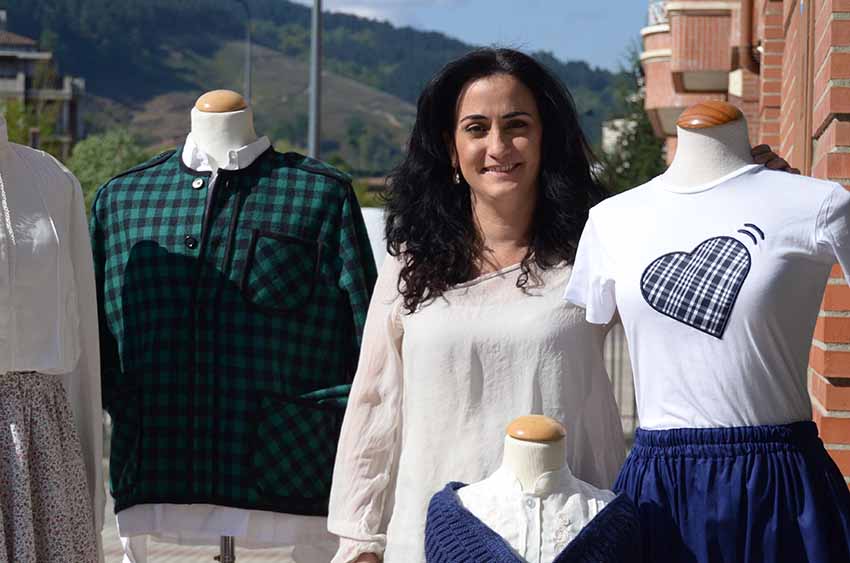Aitziber Basauri. Olatz Zugasti, Africa Baeta, Joseba Etxebarria or Ilaski Serrano. Many famous people wear clothes created by Itxaso Uzkanga (Venezuela, 1977), something she appreciates. Although she recognized that what she is most excited about is seeing people who do not know wearing her designs. “It fills me with satisfaction,” she says.
You grew up in Venezuela surrounded by the Basque culture, protected by Basque traditions.
Yes, at home we learned Basque culture and customs from a young age. I was born and raised in the Venezuelan city of Valencia. I grew up at the Basque club surrounded by our traditions. I was part of a Basque dance group, and since we met people from different parts of the Basque Country, we celebrated festivities from all over the place. Since I was little, I have lived the Basque culture very closely.
Do you consider yourself a Basque born in Venezuela?
Yes, I maintain a strong link with Euskal Herria. My mother is from Bedia and my father from Begoña, in Bilbao. They emigrated to Venezuela, where I was born. My Aitita was a gudari and my amama and ama were imprisoned in the Saturraran prison. On my father’s side, my great-grandfather was the last mayor of Begoña. When I am in Venezuela I always say that I am Basque, and here in Amorebieta, that I am Basque-Venezuelan.
What brought you to the Durango area? We heard that love was involved.
It is true that something crossed by. I have always had the Basque Country and coming here on my mind. It was clear to me that I was not going to live my entire life in Venezuela. The situation there was not the best, and that led me to make up my mind and make a decision that I had actually made before. It is not easy, because of everything I left behind, including family.
You took a new path creating Ekin Harriari, Brand, making T-shirts.
I started working with my designs at home, until I opened a small shop in 2010. I am inspired by details that catch my attention when I go places: this is how I created T-shirts with the printed image of the Santimamiñe caves or the Argiñeta necropolis; I also worked the Cross of Gorbea in silver...Then came the bags, jewelry and glassware and the customization of work clothes, always on request. In 2017, my partner, Jenny and I opened the Telarte Tailoring Workshop, we took a new step and started with embroidery.
Last year, you took over from the Jaialdi store and now you make traditional Basque costumes. A new challenge?
Yes, we started in February of last year, just before the pandemic started. We mainly make them for weddings, communions, parties…And when the pandemic hit, we had to reinvent ourselves: we began to make masks for the City Council to distribute in establishments that provide basic services. Then the public came and we started making masks out of costume fabrics, in exchange for their will. Now we make them with approved fabrics for companies. We manufacture some garments, but above all, we work on personalized products for companies.
What is the strangest thing that has been ordered?
We have personalized umbrellas, or folders and wheel covers for 4x4 vehicles...people came with a photo: a dog chasing a woodcock. Some T-shirt orders for cuadrillas at festivals are also curious.
You also have orders from the Diaspora.
Yes, from the United States and South America. Last year we were going to participate with our costumes at Jaialdi in Boise, which takes place every five years. However, the pandemic pushed it back to 2022. Let’s see if all goes well and we can attend!
Would you like to learn Basque?
I begun at the Eusko Etxea in Valencia…People at home --they do speak-- tell me all the time: it is a challenge that I still have to tackle…
(Interview published in Anboto aldizkaria on04-27-2021)






 Send to a friend
Send to a friend Add comment
Add comment








